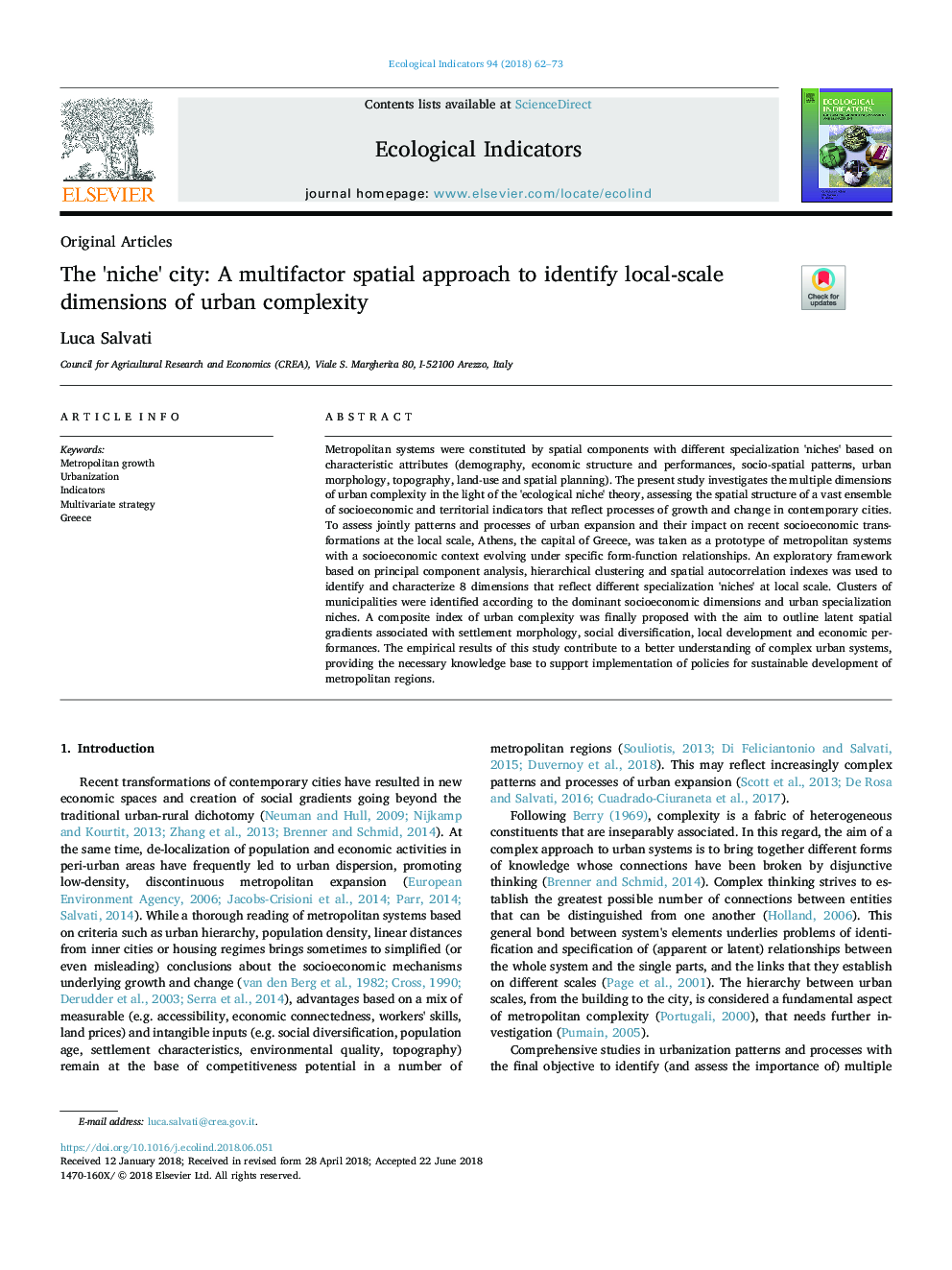| کد مقاله | کد نشریه | سال انتشار | مقاله انگلیسی | نسخه تمام متن |
|---|---|---|---|---|
| 8844989 | 1617108 | 2018 | 12 صفحه PDF | دانلود رایگان |
عنوان انگلیسی مقاله ISI
The 'niche' city: A multifactor spatial approach to identify local-scale dimensions of urban complexity
ترجمه فارسی عنوان
شهر "جغرافیایی": یک رویکرد فضایی چند فاکتور برای شناسایی ابعاد محلی در پیچیدگی شهری
دانلود مقاله + سفارش ترجمه
دانلود مقاله ISI انگلیسی
رایگان برای ایرانیان
کلمات کلیدی
رشد کلانشهرها، شهرنشینی، شاخص ها، استراتژی چند متغیره، یونان،
ترجمه چکیده
سیستم های متروپولیتن توسط اجزای فضایی با تخصص های متفاوتی «نیش» بر اساس ویژگی های مشخصی (جمعیت شناسی، ساختار اقتصادی و عملکرد، الگوهای اجتماعی-فضایی، مورفولوژی شهری، توپوگرافی، برنامه ریزی زمین شناسی و برنامه ریزی فضایی) تشکیل شده است. در این پژوهش، ابعاد متعدد پیچیدگی شهری با توجه به نظریه «جغرافیای زیست محیطی»، ارزیابی ساختار فضایی یک گروه وسیع شاخص های اجتماعی-اقتصادی و ارزیابی که روند رشد و تغییر در شهرهای معاصر را نشان می دهد، بررسی می شود. به منظور ارزیابی الگوهای و فرآیندهای گسترش شهرنشینی و تاثیر آن بر تحولات اجتماعی و اقتصادی اخیر در سطح محلی، آتن، پایتخت یونان، به عنوان نمونه اولیه سیستم های شهری با یک زمینه اجتماعی-اقتصادی تحت تکامل روابط با ویژگی های خاص شکل گرفته شد. چارچوب اکتشافی بر مبنای تجزیه و تحلیل مولفه های اصلی، خوشه بندی سلسله مراتبی و شاخص های خودکار همبستگی مکانی برای شناسایی و مشخص کردن 8 ابعاد که منافع مختلف "نیش" در مقیاس محلی را نشان می داد، مورد استفاده قرار گرفت. خوشه های شهرداری با توجه به ابعاد اجتماعی و اقتصادی غالب و نیش های تخصصی شهری مشخص شد. شاخص کامپوزیت پیچیدگی شهری در نهایت با هدف طراحی شیوه های مکان یابی غیر مرتبط با مورفولوژی، انسجام اجتماعی، توسعه محلی و عملکرد اقتصادی ارائه شد. نتایج تجربی این مطالعه به درک بهتر سیستم های شهری پیچیده کمک می کند و دانش لازم را برای پشتیبانی از اجرای سیاست های توسعه پایدار مناطق شهری فراهم می کند.
موضوعات مرتبط
علوم زیستی و بیوفناوری
علوم کشاورزی و بیولوژیک
بوم شناسی، تکامل، رفتار و سامانه شناسی
چکیده انگلیسی
Metropolitan systems were constituted by spatial components with different specialization 'niches' based on characteristic attributes (demography, economic structure and performances, socio-spatial patterns, urban morphology, topography, land-use and spatial planning). The present study investigates the multiple dimensions of urban complexity in the light of the 'ecological niche' theory, assessing the spatial structure of a vast ensemble of socioeconomic and territorial indicators that reflect processes of growth and change in contemporary cities. To assess jointly patterns and processes of urban expansion and their impact on recent socioeconomic transformations at the local scale, Athens, the capital of Greece, was taken as a prototype of metropolitan systems with a socioeconomic context evolving under specific form-function relationships. An exploratory framework based on principal component analysis, hierarchical clustering and spatial autocorrelation indexes was used to identify and characterize 8 dimensions that reflect different specialization 'niches' at local scale. Clusters of municipalities were identified according to the dominant socioeconomic dimensions and urban specialization niches. A composite index of urban complexity was finally proposed with the aim to outline latent spatial gradients associated with settlement morphology, social diversification, local development and economic performances. The empirical results of this study contribute to a better understanding of complex urban systems, providing the necessary knowledge base to support implementation of policies for sustainable development of metropolitan regions.
ناشر
Database: Elsevier - ScienceDirect (ساینس دایرکت)
Journal: Ecological Indicators - Volume 94, Part 1, November 2018, Pages 62-73
Journal: Ecological Indicators - Volume 94, Part 1, November 2018, Pages 62-73
نویسندگان
Luca Salvati,
